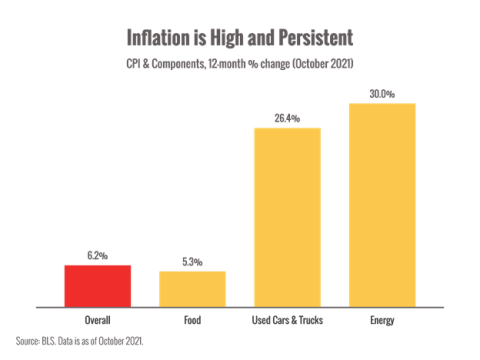Hello Eagle Wealth Community,
We hope you're well and looking forward to some time with family and friends.
Before heading home for the holidays, let’s talk about what’s in the news — infrastructure, inflation, and taxes.
President Biden just signed his much-debated bipartisan infrastructure deal.
What does that mean for the economy?
In the short term, some of the infrastructure funding will go immediately toward clearing port and transportation bottlenecks, so that might help improve supply chain issues.1 Fingers crossed.
Though it could be years before we drive across a new bridge or highway funded by the bill, some of the maintenance funds could get used in spring construction blitzes.2
Since the job market is already tight, the economy isn't likely to see an immediate surge in hiring due to infrastructure spending; however, multiple reports suggest 800,000 new jobs could be added by 2030, though many of them will be temporary rather than long-term jobs.
Economists don't think inflation is likely to increase due to the slow pace of spending, though the deal is projected to add $256 billion to the federal budget deficit over the next 10 years.
Bottom line, analysts project long-term benefits to the economy in lower business costs, increased labor force participation, and improved competitiveness.3
Inflation might not be as temporary as the Federal Reserve would like it to be.
Prices are up all over, and folks are understandably upset at paying more at the grocery store, gas station, and most everywhere else.
Many analysts hoped that data blips, supply chain clogs, and other pandemic-related disruptions were creating a temporary spike in inflation that would resolve soon.4
However, inflation has remained stubbornly high.
In the U.S., prices have increased 6.2% over the last 12 months — the biggest spike since November 1990. And you can see in the chart that some categories measured by the Consumer Price Index (CPI) have soared by much more.5
Since the Fed's goal is to keep long-term inflation around 2% (and that's what we've experienced this century), folks are concerned that "temporary" inflation is lingering longer than we want.
So, are prices going to continue to rise in 2022?
That's likely, but how much, how fast, and for how long depend on a lot of global factors, including whether the Fed raises interest rates or takes other actions.
We’re keeping an eye on it.
Will your taxes go up in 2022?
That’s the question of the month on Capitol Hill as lawmakers debate the Build Back Better deal that could come with tax law changes.
We don’t know when (or if) the bill will be passed, but we’re watching closely, and we’ll keep you updated.
We’re wishing you and yours a relaxing Thanksgiving with great food, great fun, and great memories.
Gratefully yours,
Your Eagle Wealth Team
Last month, Chad surprised the Eagle Wealth team with a rather unusual “training”.
The Eagle Wealth team headed down to Unofficial Logging Co., our local hatchet tossing hall, to see if we could ‘hack’ it. We enjoyed snacks, beverages, and played a few ax games. This was the first time throwing an ax for all of us and as it turns out, learning a new skill together can be both hilarious and exciting. We split off into two teams (Zombies vs Frankenstein) for some friendly competition. We even learned a few trick shots to keep things interesting.
How about you? Did you try any new hobbies in 2021?

The Week on Wall Street
Stocks were mixed last week in choppy trading as investors battled the crosscurrents of good economic data and a troubling rise in COVID-19 infections globally.
The Dow Jones Industrial Average slid 1.38%, while the Standard & Poor’s 500 added 0.32%. The Nasdaq Composite index gained 1.24% for the week. The MSCI EAFE index, which tracks developed overseas stock markets, dropped 0.59%.1,2,3
Trading Uncertainty
A healthy retail sales report, falling jobless claims, positive earnings surprises, and strong manufacturing data lent support to stock prices, but investor sentiment was dampened by several concerns.
Chief among these worries are a resurgence of COVID-19 infections this winter and the impact inflation may have on consumer confidence and corporate profit margins. The uncertainty surrounding the renomination of Fed Chair Powell exacerbated this unease; a decision from President Biden may come soon. Technology and other high-growth companies led the market, while some of the reopening stocks, such as travel and energy, lagged.
Retail Sales Jump
October retail sales increased 1.7%, indicating that consumers may be more confident than recent surveys have suggested. Sales of electronics, appliances, and autos were particularly strong last month.4
The market cheered the report, interpreting the results as a sign that inflation has not discouraged Americans from buying the products and services they want or need. This retail sales number, however, may be overstated for two reasons. First, higher prices increase the level of sales even if consumer demand is flat. Second, spending may have been pulled forward by consumer worries over higher future prices and concerns that goods may not be available during the holiday shopping season.
Final Thought
We want to take this opportunity to wish you and your family a wonderful Thanksgiving, full of family, fun, and joy.
On this special day of gratitude, we would also like to express our appreciation to you for extending us the privilege of serving you this year and helping you pursue your important financial goals.
|
THE WEEK AHEAD
Key Economic Data
Monday: Existing Home Sales.
Tuesday: Composite PMI (Purchasing Managers’ Index) Flash.
Wednesday: Jobless Claims. Durable Goods Orders. Gross Domestic Product (GDP). New Home Sales. Consumer Sentiment. Federal Open Market Committee (FOMC) Minutes.
Source: Econoday, November 19, 2021
The Econoday economic calendar lists upcoming U.S. economic data releases (including key economic indicators), Federal Reserve policy meetings, and speaking engagements of Federal Reserve officials. The content is developed from sources believed to be providing accurate information. The forecasts or forward-looking statements are based on assumptions and may not materialize. The forecasts also are subject to revision.
Companies Reporting Earnings
Monday: Zoom Video Communications, Inc. (ZM).
Tuesday: Best Buy Co., Inc. (BBY), Dollar Tree, Inc. (DLTR), Dell Technologies, Inc. (DELL), Autodesk, Inc. (ADSK), Analog Devices, Inc. (ADI).
Wednesday: Deere & Company (DE).
Source: Zacks, November 19, 2021
Companies mentioned are for informational purposes only. It should not be considered a solicitation for the purchase or sale of the securities. Investing involves risks, and investment decisions should be based on your own goals, time horizon, and tolerance for risk. The return and principal value of investments will fluctuate as market conditions change. When sold, investments may be worth more or less than their original cost. Companies may reschedule when they report earnings without notice.
|
|
|








